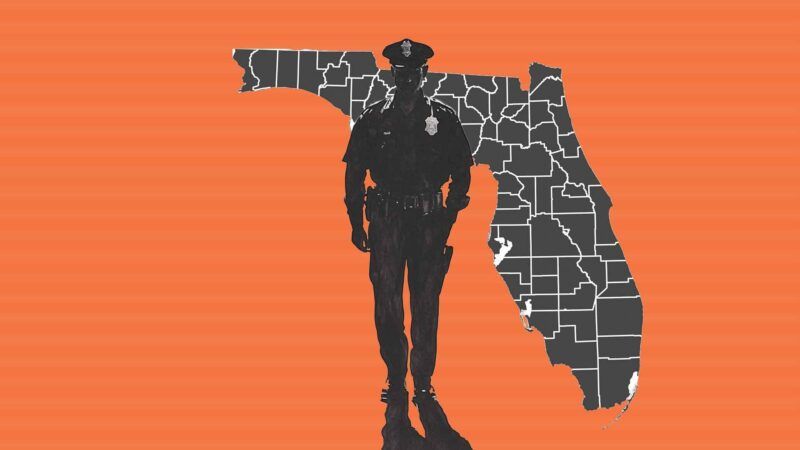Florida Lawmakers Don't Want You To Know When a Cop Shoots Someone
The Sunshine State is considering a bill that would expand protections for law enforcement officers who use deadly force or cause great bodily harm.

A Florida bill that could allow agencies to withhold the names of police officers involved in use-of-force incidents resulting in death or great bodily harm has passed in the state Senate Criminal Justice Committee with little opposition. Companion legislation has also advanced in the state's House of Representatives.
The bill, sponsored by Sen. Joe Gruters (R–Sarasota), was introduced in response to a 2023 Florida Supreme Court ruling that the state's constitutional protections for alleged crime victims under the state's current Marsy's Law do not include a right to anonymity.
The court's opinion stemmed from a 2020 case involving two fatal police shootings in Tallahassee. Reporters sought the names of the officers involved, whose use of force was deemed justified, to enhance transparency and the public's trust in the department. But under Marsy's Law, these officers were considered victims, and departments were banned from disclosing "information or records that could be used to locate or harass the victim or the victim's family, or which could disclose confidential or privileged information of the victim."
The court's seven Republican-appointed justices took a textualist approach and held unanimously that no victim—police officer or otherwise—had the right to remain anonymous under Marsy's Law as written. The court reasoned that the central clause of the ban did not include the concept of identity, which the law's drafters were capable of including. Further, the court was concerned that broadening the interpretation of the clause would introduce inconsistencies within other areas of the state constitution and undermine defendants' right to confront witnesses.
However, the court stated that the opinion did not prevent an expansion of the law to exempt more information from disclosure, leaving the door open to future legislative action. Now, Florida legislators are considering Gruters' bill to reverse the court's ruling and expand Marsy's Law protections by exempting the release of alleged crime victims' names in public records.
But the bill's language doesn't stop there. The proposal also creates an additional protection within the existing Marsy's Law for law enforcement officers involved in "use of force incidents," defined as those where an officer uses deadly force or force that results in great bodily harm. The bill mandates that the names of officers involved in a use-of-force incident cannot be disclosed for a minimum of 72 hours following an incident. Employing agencies would also be granted the ability to extend the confidentiality period indefinitely or until the agency determines that anonymity is no longer necessary. This provision would extend alleged crime victims' anonymity protections advocated for by Marsy's Law proponents to all law enforcement officers, regardless of whether the officer was a victim of a crime when force was used.
Marsy's Law amendments, which have been enacted in 12 states (and overturned in two), have been criticized for being, at best, confusing, vague, and duplicative, and at worst, seriously infringing on defendants' constitutional and due process rights. Criminal justice transparency is essential to building public trust, which is why civil rights groups, like the American Civil Liberties Union, have warned that versions of Marsy's Law could be abused by law enforcement to shield officers who use force while on duty from accountability.
Gruters' proposed changes to Florida's Marsy's Law not only invite such abuse—they almost guarantee it.


Show Comments (23)